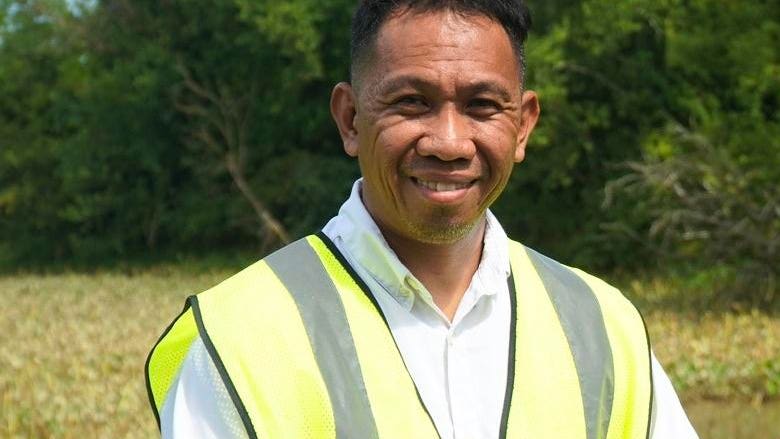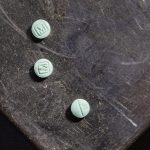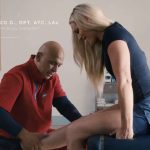Hundreds of everyday products are made with highly toxic fluorinated chemicals called PFAS, a group of chemicals used to make fluoropolymer coatings and products that resist heat, oil, stains, grease, and water.
They are often referred to as “forever chemicals” because they build up in our bodies and never break down in the environment. Very small doses of PFAS have been linked to cancer, reproductive and immune system harm, and other diseases, according to the Center for Disease Control.
Most remediation methods involve dredging contaminated waters or digging fouled landfills and shipping it to special incinerators to be burned. The EPA requires that an incinerator destroy and remove at least 99.99 percent of each harmful chemical in the waste it processes, but this process is expensive and time consuming.
“We refuse to believe that digging and hauling to a landfill to somebody else’s backyard, what we call a very expensive change of zip codes, is the solution. We feel we have a chance of becoming this instrument of change to improve the environment because we utilise innovation to truly solve the issue on site without burning it,” says Sergie “Serg” Albino, founder and CEO of ecoSPEARS.
Founded in 2017, the Altamonte Springs, Florida-based ecoSPEARS is a cleantech solutions company specializing in environmental clean-up. The company has designed and developed green and sustainable remediation technologies to extract and destroy and permanently remove PCBs, dioxins, and other Persistent Organic Pollutants (POPs) from the environment without resorting to costly and hazardous incineration methods.
For Albino, his mission to remove the world of forever chemicals began at NASA. “I was fortunate enough to work for the space shuttle and International Space Station program. My last year there in 2011 2012, I was fortunate to work with Dr. Jackie Quinn, an environmental engineer at NASA’s Kennedy Space Center in Florida, who was one of just 15 innovators inducted into the National Inventors Hall of Fame (NIHF) Class of 2018,” says Albino.
Quinn developed an emulsified zero-valent iron filtration process that provides a method to remove environmental contamination from groundwater in a quick, effective and cost-competitive manner. “I always joke around that she was like my NASA mom. She was an incredible mentor. But she actually was an incredible inventor also,” says Albino. Quinn had invented the SPEARS technology that would become the namesake for ecoSPEARS when Albino licensed the technology to start his company.
Quinn was looking for a partners to NASA to commercialise the technology and make it cheaper to achieve wider adoption. “God bless my NASA friends, they don’t know how to make anything cheap. So I started consulting for them. And then I also started collaborating with the Rollins College business school and in that same year, serendipity happened where NASA actually approached Rollins where they would team technologies with students. That became the start of ecoSPEARS in 2017,” says Albino, whose company was given an exclusive license for the technology by NASA.
So why ecoSPEARS and not the giant, publicly traded environmental companies like AECOM, Clean Harbors and Entact?
“Everybody thought we were crazy in the beginning. But our investors believed in us as did our clients. Actually, the first six months of the company, we actually went direct to the environment consulting groups, because they were the gatekeepers. We learned right away, that they didn’t want us to disrupt their business model,” says Albino. According to Albino, the big companies require long-term, multi-million and sometimes multi-hundred-million-dollar contracts. The ecoSPEARS technology was cheap and starts working as soon as it’s installed.
Having attained a “comfort” letter from the EPA, the company now goes direct to clients by working through the environmental attorneys at Fortune 100 companies, state regulators and the EPA itself.
Albino recognises it will take time to educate the marketplace to their technology but is now seeing breakthroughs. According to Albino, The SPEARS technology has been deployed as far west as Guam with the US Coast Guard at the Port of San Diego and with Pepco to name a few. And they now have service agreements with two largest environmental consulting firms.
To date, the company has raised $3.1 million in funding over 5 rounds, much of it in the form of grants. Their latest funding was raised in June of 2023 from a grant round from Ocean Impact. Additional investors include venVelo, Katapult Ocean and others.
Albino’s journey to becoming an environmental technology entrepreneur starts in the Philippines where he grew up and where he developed his love of nature. His father was in finance and his mom was a nurse. “I grew up in just a regular family. However, I attribute a lot of my entrepreneurship mindset to my Mom,” says Albino.
Albino’s mother left the Philippines to come to America to seek a better opportunity for her family. She established herself as a nurse in the US and then petitioned to have the family join her. Albino moved to New York and thought he would pursue a fine arts education, then the family relocated to central Florida where fine arts was not available. “So, I pursued my other passion to become an astronaut. But I also loved engineering,” says Albino.
He would go on to study aerospace engineering at the University of Central Florida. That led to a research job at the Department of Defense, then Siemens, followed by his work with NASA at the Kennedy Space Center through a series of engineering roles at NASA contractors. He would go on to launch several engineering businesses before his role as an adjunct professor at the Crummer Graduate School of Business at Rollins College would lead him back to Jackie Quinn at NASA where the idea for ecoSPEARS was born in 2017.
As for the future? “ecoSPEARS is focused on being the instrument of change and the hope for the environment for the future. Dean Kamen once said, ‘Every once in a while, a new technology, an old problem, and a big idea turn into an innovation.’ And that resounds really well in what we do at ecoSPEARS,” concludes Albino.
Read the full article here










